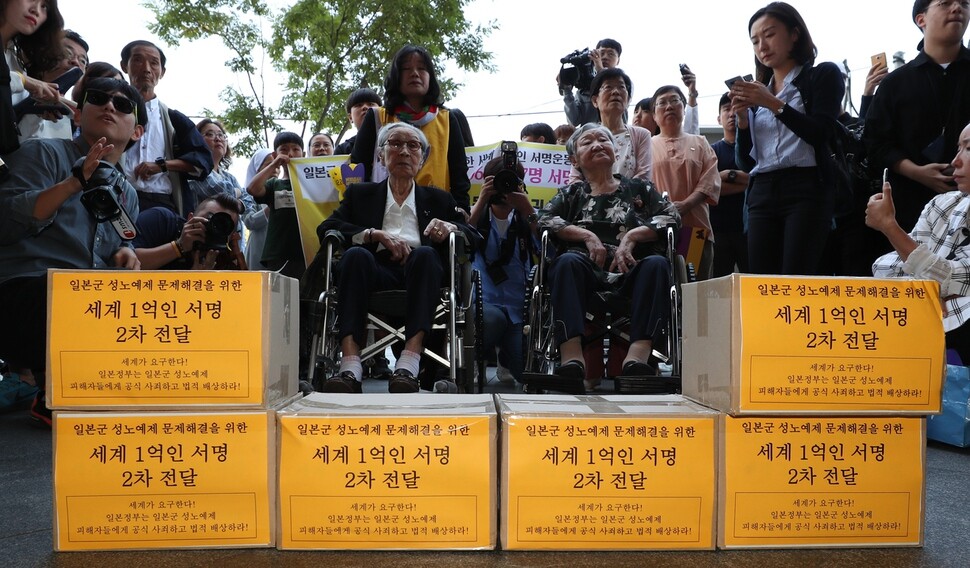hankyoreh
Links to other country sites 다른 나라 사이트 링크
Comfort women continue long quest for justice

What began as a lonely protest on Jan. 8, 1992, marked its 1,300th event on Sept. 13. Attended by around 300 people, the occasion included a dance routine by sixth grade elementary school students and chants by other students in uniform. It was the 1,300th of the weekly Wednesday demonstrations for a resolution to the Japanese military sexual slavery issue, an event held every Wednesday afternoon across from the former Japanese embassy building in Seoul’s Junghak neighborhood.
The Japanese military comfort women survivors’ calls for the Japanese government to acknowledge criminal actions and provide lawful compensation remain unanswered.
“Things reached the point where the [Shinzo] Abe and Park Geun-hye administrations negotiated a free pass [for Japan] in 2015 without any proper apology and with a one billion yen (US$9.1 million) ‘contribution’ of uncertain identity instead of lawful compensation,” the group Korean Council for the Women Drafted for Military Sexual Slavery by Japan (Jeongdaehyeop) said on Sept. 13.
“Despite listing renegotiation and nullification of the South Korea-Japan [comfort women] agreement as one of its campaign pledges, the Moon Jae-in administration has not taken any action after four months in office,” the group said”
After the demonstration ended that day, survivors Kim Bok-dong, 91, and Gil Won-ok, 89, sent an open letter to the Blue House demanding that the 2015 agreement with Tokyo on the comfort women issue be nullified, the Reconciliation and Healing Foundation disbanded, and the billion yen returned.
“When the Wednesday demonstrations first began in 1992, South Koreans could not even be here with the victims, whom they viewed as shameful and embarrassing people,” said Jeongdaehyeop co-president Yoon Mee-hyang.
“But these women have not been afraid to stand up here before us, knocking on our conscience with their cries that ‘you are the shameful ones,’” she added.
“The South Korea and Japanese government excluded the victimized parties and ignored their human rights, declaring the matter ‘finally and irreversibly resolve’ with a mere payment of one billion yen,” Yoon said of the agreement.
“Starting with the 1,301st [demonstration], we will redouble our efforts to realize freedom by our own hands, something that no one else created for us,” she continued.
Also attending the Wednesday demonstration were university students Ha Ju-yeong and Jo Yong-ju, who biked around 5,400 km from Glendale, California, to New York in June to raise awareness of the comfort women issue. Ha and Jo called for a swift resolution to the matter.
“With human rights, there are no divisions of ‘more and less important,’ but this does seem to be an urgent issue,” they said.
A total of 239 comfort women survivors are registered with the South Korean government. Thirty-five remain alive today.
Before the demonstration, Jeongdaehyeop delivered details to the Japanese Embassy on the signatures of 2,069,760 from 155 countries, representing the second group in its “100 million global citizen signature campaign” to urge a resolution on the comfort women issue. The group, which has been holding the signature campaign since 2013, submitted a first group of around 1.5 million signatures in June 2014 to the UN Human Rights Council in Geneva.
By Park Su-ji, staff reporter
Please direct questions or comments to [english@hani.co.kr]

Editorial・opinion
![[Column] Has Korea, too, crossed the Rubicon on China? [Column] Has Korea, too, crossed the Rubicon on China?](https://flexible.img.hani.co.kr/flexible/normal/500/300/imgdb/original/2024/0419/9317135153409185.jpg) [Column] Has Korea, too, crossed the Rubicon on China?
[Column] Has Korea, too, crossed the Rubicon on China?![[Correspondent’s column] In Japan’s alliance with US, echoes of its past alliances with UK [Correspondent’s column] In Japan’s alliance with US, echoes of its past alliances with UK](https://flexible.img.hani.co.kr/flexible/normal/500/300/imgdb/original/2024/0419/2317135166563519.jpg) [Correspondent’s column] In Japan’s alliance with US, echoes of its past alliances with UK
[Correspondent’s column] In Japan’s alliance with US, echoes of its past alliances with UK- [Editorial] Does Yoon think the Korean public is wrong?
- [Editorial] As it bolsters its alliance with US, Japan must be accountable for past
- [Guest essay] Amending the Constitution is Yoon’s key to leaving office in public’s good graces
- [Editorial] 10 years on, lessons of Sewol tragedy must never be forgotten
- [Column] A death blow to Korea’s prosecutor politics
- [Correspondent’s column] The US and the end of Japanese pacifism
- [Guest essay] How Korea turned its trainee doctors into monsters
- [Guest essay] As someone who helped forge Seoul-Moscow ties, their status today troubles me
Most viewed articles
- 1[Column] The clock is ticking for Korea’s first lady
- 2Hong Se-hwa, voice for tolerance whose memoir of exile touched a chord, dies at 76
- 3After 2 months of delayed, denied medical care, Koreans worry worst may be yet to come
- 4[Column] Has Korea, too, crossed the Rubicon on China?
- 5US overtakes China as Korea’s top export market, prompting trade sanction jitters
- 6Samsung barricades office as unionized workers strike for better conditions
- 7[Correspondent’s column] In Japan’s alliance with US, echoes of its past alliances with UK
- 8All eyes on Xiaomi after it pulls off EV that Apple couldn’t
- 9[Correspondent’s column] The US and the end of Japanese pacifism
- 10[Guest essay] How Korea turned its trainee doctors into monsters